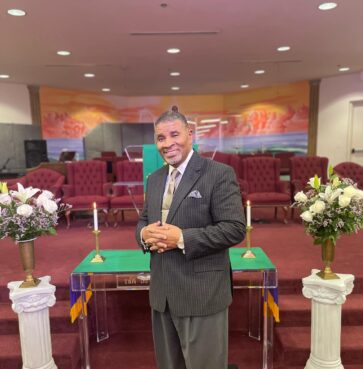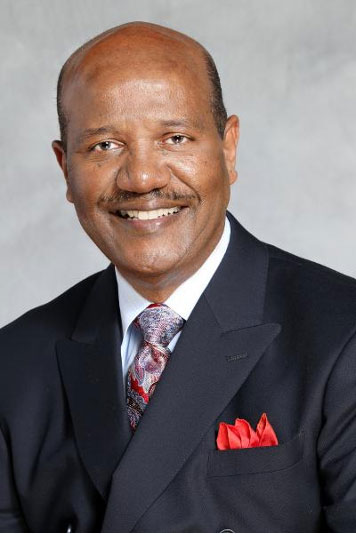(RNS) — The Rev. Jimmy Thorn was counting on a retirement spent enjoying time with and providing support for the next generations of his family.
But Thorn, 79, one of some 4,500 clergy and staffers who lost funds in a retirement plan of the African Methodist Episcopal Church, continues to await the fulfillment of a pledge made by the historically Black denomination to make “participants whole.”
The AME Church has been accused of mishandling the retirement funds, leaving many plan participants with about 30% of what they had hoped to use for retirement. The denomination accused its former retirement department head of embezzlement after discovering in 2021 that he provided “deceptive, false and grossly inflated financial statements” about the retirement plan.
“I certainly could have had a much better quality of life after retirement had I known that we had problems with the annuity,” said Thorn, who lives in suburban Chicago, after decades of serving as a pastor and two years as a presiding elder. “I had made personal plans, plans for my offspring, plans for additional investments, travel, and my quality of life just diminished — not that I’m hungry or destitute, but it is not what we had intended to do.”
But ministers like Thorn and AME Church staffers could soon see a court’s final approval of proposed partial settlements with the church and Newport Group Inc., a third-party administrator involved with the church’s retirement services, which would return a portion of lost funds. A judge in the U.S. District Court for the Western District of Tennessee has scheduled a June 26 hearing, at which final approval will be considered. Under a preliminary settlement agreement, the AME Church was to make two payments totaling $20 million into a settlement fund and Newport was to deposit $40 million in that fund.
Others are continuing with litigation, scheduled for trial next April, which is not part of these settlements.
Early in the litigation, the plaintiffs said some $88.4 million was lost from the retirement funds, a crisis the AME Church said was the result of embezzlement by the Rev. Jerome V. Harris, who resigned in 2021 after 21 years as head of the denomination’s Department of Retirement Services. He died in May 2024, of a heart attack. His estate and Symetra Life Insurance Co. are among additional defendants in the case.
RELATED: AME Church announces retirement settlement agreement during General Conference
Douglass Selby, general counsel of the AME Church, confirmed in an interview with Religion News Service that there is more than $60 million in the settlement fund, due to accruing interest. “Everyone has met the obligations under the settlement agreement,” he said.
Lawyers for the plaintiffs, whose single case was previously consolidated from six as part of a multiyear legal process, expressed confidence that if the settlements are approved, there will be substantial financial assistance for plan participants or their beneficiaries.
“The class members will receive a significant percentage of the money missing from their accounts, which could be life changing for some plan participants,” Matthew Lee, one of the lawyers representing the plaintiffs, told RNS.
However, Lee said, based on information gathered during the litigation, the plaintiffs believe the retirement fund could have been worth far more in 2021 — approximately $227 million more — than the actual balance of $38 million in that fund if the plan’s assets had been “invested in a reasonable and prudent manner or invested similarly to other retirement plans.”
Defendants in the case dispute this claim. The parties involved in the settlements, which include AME Church defendants such as its Council of Bishops, Department of Retirement Services and General Board, as well as Newport, have not admitted to any liability.
“The Settling Defendants deny that they are at fault, they violated any law, nor engaged in any wrongdoing,” reads a statement from the settlement administrator in a notice describing the settlement plans, sent to retirement plan participants. “The Plaintiffs have agreed to the Settlements to avoid the costs and risks associated with continuing the Lawsuit against the Settling Defendants, and to allow the Settlement Class Members to receive compensation.”
Lawyers for other parties in the case either declined to comment or did not respond to an emailed request.
In a June 12 memo supporting final approval of the proposed settlements, lawyers for the plaintiffs said none of the 4,517 plan participants opted out of either of the settlements. Two retired Florida ministers filed objections, which were, in part, about attorneys’ fees that could total as much as one-third of the total settlement amount, including interest. The plaintiffs’ lawyers have asked the judge to overrule the objections.
The Rev. Charles Larkin Scott Sr., 75, a retired AME minister in Royal Palm Beach, said the “financial devastation has forced dependence on adult children after a lifetime of self-reliance.” He wrote to the court about his objection, seeking “higher scrutiny” about the lawyers’ fees.
“While attorneys receive millions in fees, elderly victims like me are to recover only a fraction for years of ongoing suffering and permanent destruction of retirement security,” he wrote.
Scott added in an email to RNS: “I am concerned about the treatment of the retired ministers caused by this terrible situation and welcome any opportunity that might improve our condition.”
The Rev. Earl Harris, 80, a retired AME minister who lives in the Dayton, Ohio, suburb of Kettering, traveled to the Tennessee courtroom to listen to a retirement plan hearing earlier this year.
“I’ve gone simply to show the court that there are faces and voices to that group who is victimized by this but who have elected not to sue the church,” said Harris, who is not related to Jerome Harris. “I love my church and I’m just disappointed that we are not operating in a more godly fashion. This shouldn’t have happened. It just shouldn’t have happened, not with church people.”
Earl Harris said his and his wife’s ownership of charter schools has helped them financially in his post-pastoral retirement. He said he was struck by the dozens of lawyers appearing in court on behalf of the suits’ many parties.
Some AME ministers said communication from the church has been confusing or lacking as they await the outcome of the court proceedings. Some participants in the retirement plan, often referred to as the “legacy plan,” received letters in January and March that seemed to contradict each other in describing available retirement funds, and the latter letter included an apology “for any confusion.”
Asked about the letters, Lee, the plan participants’ lawyer, said their balances should be determined by the court.
“Many were confused,” he said. “We were too. We supported the (March) retraction and understand that it renders the first letter void.”
The Rev. J. Edgar Boyd, 77, a leader of the “AMEs for Justice and Accountability” group, said he’s heard from retired clergy whose economic situations have been “imperiled tremendously” in the wake of the retirement fund losses.
“Many retirees — retired pastors that I have actually spoken to or have spoken with others about — some of them have had to go and live with their own children,” said Boyd, former senior pastor for the First AME Church of Los Angeles. “Some of them have lost their property because they couldn’t make the payments, the mortgage payment on it, or had to sell it for a smaller amount.”
Earl Harris, who joined Boyd at one of the court hearings, said he is concerned about those who have not had the funds or additional income to rely on in their retirement years.
“They’re looking for jobs,” he said. “Their children are supporting them. Several of them have filed for bankruptcy. It’s really been rough for a number of them.”
RELATED: As AME Church meets for General Conference, retirement plan questions continue








